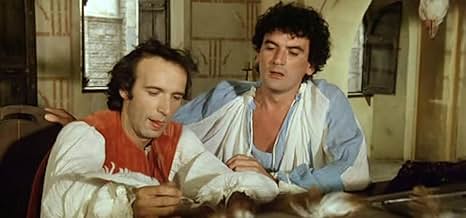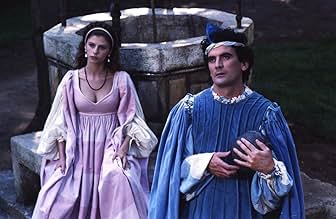Non ci resta che piangere
- 1984
- 1h 53min
NOTE IMDb
7,6/10
7,6 k
MA NOTE
Ajouter une intrigue dans votre langueIn the 80s, two friends misteriously wake up in the XV century and clumsly try to intermingle with the society of the time.In the 80s, two friends misteriously wake up in the XV century and clumsly try to intermingle with the society of the time.In the 80s, two friends misteriously wake up in the XV century and clumsly try to intermingle with the society of the time.
- Réalisation
- Scénario
- Casting principal
- Récompenses
- 1 nomination au total
Avis à la une
"Non ci resta che piangere" is definitely a piece of art, directed by two of the most important Italian comedy writers: Benigni and Troisi. This is the work of a Napolitan and a Tuscan comic put together to make a film that'll make you laugh from its start and if you start, you'll never stop.
The plot is very simple: Mario and Saverio, a teacher and a janitor in an elementary school, find them in the year 1492 and it is the origin of all the funny situations you'll find in the movie.
The language used by Mario and Saverio is Italian, but Mario uses a typical Naples accent and Saverio it's using his Tuscan influence, so the language they use is crucial to the final meaning of the movie.
In the original version there was an additional scene, that the directors had to cut off when publishing the movie, despite this the movie is still very funny, and is its freshness, its lack of bad words what makes it a good comedy and a good film.
Ending, I think this movie is one of the best ever produced in Italy, but unfortunately, due to its dialectal language and the direct speech it can't be translated to other languages.
The plot is very simple: Mario and Saverio, a teacher and a janitor in an elementary school, find them in the year 1492 and it is the origin of all the funny situations you'll find in the movie.
The language used by Mario and Saverio is Italian, but Mario uses a typical Naples accent and Saverio it's using his Tuscan influence, so the language they use is crucial to the final meaning of the movie.
In the original version there was an additional scene, that the directors had to cut off when publishing the movie, despite this the movie is still very funny, and is its freshness, its lack of bad words what makes it a good comedy and a good film.
Ending, I think this movie is one of the best ever produced in Italy, but unfortunately, due to its dialectal language and the direct speech it can't be translated to other languages.
I like the Italians, most of all, but I do not like Massimo Troisi and Roberto Benigni, for me are the most annoying actors ever. Troisi, you do not understand what he says, in all the films he speaks in a kind of dialect that only he understands. In all the movies is the same, boring at the top. You got to have a great deal of steel patience and great love for cinema to watch this movie in its entirety. Troisi and Benigni, who are also directing, are not genius and are not funny at all.
10opossumd
Totally unawares, Saverio, a teacher and Mario, a janitor of the same school in which they both work, travel back in time and find themselves in central Italy at the end of the 15th century. They carry with them an unresolved squabble concerning Saverio's sister, creating a lot of tension between the two, which will increase in the plot. From this moment on they will have to come to grips with the grotesque situation they find themselves in, trying to "hitch a lift" back to the future in a most outlandish way, using and misusing their foresight of the events taking place round that time, and generally making fools of themselves in the eyes of "normal" renaissance folks. Their meeting with Leonardo da Vinci is hysterical, when they become more and more convinced that the genius is in reality a moron. Another character they meet is Savonarola the heretic, who enjoins them to repent, before he is taken to the stake, eliciting some breezy comment from them. If it weren't for a weird kind of homesickness, they would quite enjoy living in this period, full of daring fashions and tantalising damsels.
The couple shows great chemistry and is funny in every respect. The psychology of their characters is complex and credible - for once comical roles with a depth. Basically, Saverio is an embittered petit-bourgeois forever attracted and rejected by women, envious of Mario, an easy-going proletarian every woman falls in love with. Saverio is scheming, mean and vindictive as much as Mario is naive, generous and forgiving. What a match of talents: Roberto Benigni and Massimo Troisi at the peak of combined creativity. Too bad they will never come back together for another joint venture. Or maybe it is better this way: masterpieces of this level cannot be improved on, at best they can be imitated. For this reason Non ci resta che piangere will shine like a gem in the crown of the best Italian movies of all times. Sadly not many people seem to have seen it, not even in Italy, where the viewers do not need subtitles to enjoy the hilarious juggling of the two actors with the language, but their body language can be universally appreciated.
If you miss it you will have to repent!
The couple shows great chemistry and is funny in every respect. The psychology of their characters is complex and credible - for once comical roles with a depth. Basically, Saverio is an embittered petit-bourgeois forever attracted and rejected by women, envious of Mario, an easy-going proletarian every woman falls in love with. Saverio is scheming, mean and vindictive as much as Mario is naive, generous and forgiving. What a match of talents: Roberto Benigni and Massimo Troisi at the peak of combined creativity. Too bad they will never come back together for another joint venture. Or maybe it is better this way: masterpieces of this level cannot be improved on, at best they can be imitated. For this reason Non ci resta che piangere will shine like a gem in the crown of the best Italian movies of all times. Sadly not many people seem to have seen it, not even in Italy, where the viewers do not need subtitles to enjoy the hilarious juggling of the two actors with the language, but their body language can be universally appreciated.
If you miss it you will have to repent!
Non ci resta che piangere is an amazing movie. The plot may seem a bit improvised, but that movie is much more than just an excuse for some hilarious gags. It contains all the philosophy of Benigni and Troisi, and presents all the different aspects and approach to life of Neapolitans and fiorentini personalities, away from stereotypes (as usual!). It is one of the funniest movies ever, and still, it makes me cry (maybe because I can't help thinking about Troisi, Napoli's best artist of the late XX century). It is a movie many people should see, but when I travel overseas I find it almost impossible to find in rental shops, or wherever.
A real masterpiece by Benigni and Troisi. The plot is very simple and there are no special effects. However, what earns this book a place in history books is the outstanding acting performance of these two comedians. You can see from the beginning that most of the sketches are improvisations; their acting is so natural and clean. The reason why it did not gain international recognition is because it cannot possibly transmit the same emotions with with subtitles. Translation becomes nonsense in a movie that is so culturally-bound. I wish I could recommend it to everybody, but I must say that you really need to understand Italian plus some Neapolitan and Florentine dialect in order to appreciate it in its entirety. Besides, you also need to know a little bit about the culture and history of Italy. In Italy, this was, is and will always be an outstanding piece of art.
Le saviez-vous
- AnecdotesThe screenplay is the main guideline for the film but many dialogues were improvised by Troisi and Benigni.
- Citations
[last lines]
Saverio: Look! A train! I told you we would return to the present!
Mario: I'm not marrying Gabriellina!
Saverio: Oh yes you are!
Leonardo da Vinci: Engineers! TRAIN!
Leonardo da Vinci: For God's sake! 33%... 33%... and 33%...
[cut to a shot of the train and freeze as the film ends]
- ConnexionsEdited into Bellissimo: Immagini del cinema italiano (1985)
- Bandes originalesNel blu dipinto di blu
Written by Domenico Modugno and Franco Migliacci
Meilleurs choix
Connectez-vous pour évaluer et suivre la liste de favoris afin de recevoir des recommandations personnalisées
- How long is Nothing Left to Do but Cry?Alimenté par Alexa
Détails
- Date de sortie
- Pays d’origine
- Langues
- Aussi connu sous le nom de
- Nothing Left to Do but Cry
- Lieux de tournage
- Sociétés de production
- Voir plus de crédits d'entreprise sur IMDbPro
Contribuer à cette page
Suggérer une modification ou ajouter du contenu manquant

Lacune principale
By what name was Non ci resta che piangere (1984) officially released in Canada in English?
Répondre











